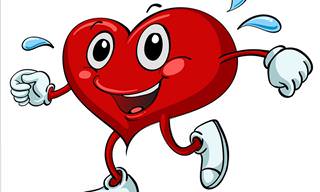High cholesterol is one of the top risk factors for heart diseases, including heart attacks and strokes. The World Health Organization (WHO) estimates that high cholesterol contributes to 2.6 million deaths every year.
Some of the leading factors that increase 'bad' cholesterol levels in the body include obesity, poor diet, physical inactivity, smoking, and alcohol consumption. High cholesterol is often considered an ‘invisible killer,’ as it typically doesn't manifest itself through symptoms, making it difficult to detect.
New research, however, indicates that some bodily changes can be a warning sign that your cholesterol levels are too high. A leading cardiologist warns that it might lead to a condition that can cause smelly secretions.
Related: Reduce Your Cholesterol Quickly with These 11 Tips
The tell-tale sign of high cholesterol
High cholesterol is a fatty substance that can build up in your blood. Consistently high cholesterol levels can cause serious complications and increase your risk of heart problems and strokes.
Doctor Sami Firoozi, a consultant cardiologist at the Harley Street Clinic, part of HCA Healthcare UK, warns that the most obvious signs of high cholesterol follow on from peripheral artery disease (PAD), wherein an accumulation of fatty deposits made from cholesterol and other waste substances block the arteries and restrict blood supply to leg muscles.
PAD is usually a sign of fatty deposit build-up in the arteries. Firoozi says that a tell-tale sign of PAD can cause “smelly pus” to develop on your toes and lower limbs.

“Although PAD is not immediately life-threatening, the process of atherosclerosis that causes it can sometimes lead to serious and fatal problems, such as critical limb ischemia which occurs if the blood flow to the legs becomes severely restricted,” Firoozi was quoted as saying.
According to the UK's National Health Services (NHS), critical limb ischemia is an “extremely serious” complication that can be “challenging to treat.”
Firoozi explains that during this condition, the skin on your toes or lower limbs becomes cold and numb. Next, they turn red and then black, and/or begin to swell and produce smelly pus. This can eventually lead to gangrene. This complication can cause severe pain and needs to be addressed at the earliest.
In some cases, high cholesterol can also give red flags earlier on in the process. Sometimes, cholesterol can deposit around the eyes to form fatty, yellowish lumps. While they are usually harmless, these deposits sometimes indicate a serious underlying issue.
Other warning signs of PAD may include:
- Severe pain or numbness in the feet even when you are resting.
- Thickening of the toenails.
- Open sores on your feet and legs that do not heal.
- Diminished pulse in the legs or feet.
- Skin turning shiny, smooth, pale, and dry.
- Loss of muscle mass in your legs.
- Pain when using the arms.
- Coldness in the legs or feet.
The most reliable way of determining your levels is through a blood test. If you experience any of these symptoms, contact your general physician immediately. Your doctor may recommend some tests and medications depending on your age, weight, and other underlying conditions.
Related: 8 Bad Eating Habits that Increase Your Cholesterol!
How to lower cholesterol

The good news is that there’s plenty you can do to get your cholesterol levels to drop. If your test results show a small rise in cholesterol levels, you can start making immediate lifestyle changes to help lower them.
For healthy cholesterol and good heart health, the NHS says it’s important to:
- Cut down on fatty foods such as meat, sausages, butter, cakes, and biscuits, and foods that contain coconut oil or palm oil.
- Try to eat more high-fiber foods, oily fish, brown rice, nuts and seeds, and fruits and vegetables.
- Be more physically active for at least 30 minutes 5 days a week.
- Cut down on alcohol and stop smoking.
Our article on Foods That Help to Cleanse Arteries will provide you with some more information.
At times, changing your lifestyle may not be enough. Your doctor may then instruct you to take medication to prevent further problems.
As we already mentioned, high cholesterol is often dubbed "the silent killer." Therefore, it is imperative to get tested for it so steps can be taken to lower levels.
Share this post with all your friends and family...
 Go to BabaMail
Go to BabaMail


























